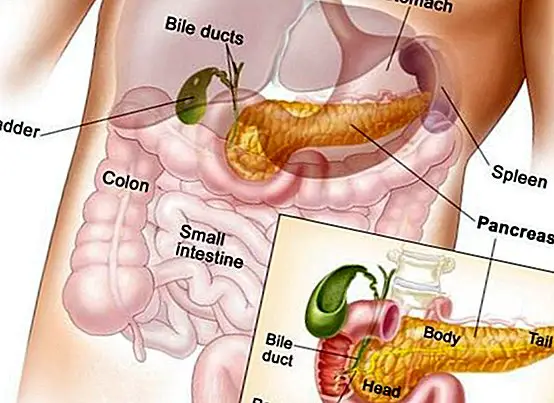What is hepatitis, how many types are there and what symptoms does it produce?
The hepatitis It is considered one of the most common diseases that, in a usual way, most tend to affect our liver, one of the most important organs of our body.
Is a inflammatory process of the liver caused by an infection (such as viral hepatitis, which has been caused by a virus) or by ingestion of toxic substances.

However, depending on its cause, we can find ourselves at present with different types of hepatitis, so that its danger or not in terms of the risks that its contagion poses to health are equally different.
What is hepatitis?
As we explained in the previous lines but in a brief way, hepatitis is an inflammatory process of the liver, caused mainly by the ingestion of certain toxic substances, or by casus of infectious origin.
In this way, hepatitis caused by the ingestion of toxic substances includes the consumption of some drugs, synthetic drugs or alcohol. Thus, for example, we can mention alcoholic hepatitis caused, as we will see, by the consumption of alcohol.
While infectious causes include viral hepatitis, which have been caused by a virus (of different types: A, B, C, delta, E, F and G).
However, it is necessary to take into account that the most common are hepatitis A, B and C (these last two being considered as medically more serious, and with a greater risk of chronicity).
How many kinds of hepatitis are there? Main types of viral hepatitis
Hepatitis A
It is a hepatitis whose contagion occurs above all through the consumption of both infected food and water.
Among its main symptoms are nausea and vomiting, general fatigue, headache and intestinal disorders.
As far as medical treatment is concerned, in most cases a period of rest and a controlled diet prescribed by the doctor, which especially does not fatigue the liver, suffices.
Before finalizing it is necessary to indicate that currently there is a vaccine advised by the WHO, which helps to prevent and avoid its contagion.
Hepatitis B
It is a hepatitis that is mainly spread through infected blood. For this reason, the main routes of infection are the use of non-sterile surgical instruments, infected syringes or instrumentation to make piercings or tattoos.
Its symptoms include: headache, fever and intestinal disorders.
The treatment goes by following rest and a healthy diet.
Given that hepatitis B becomes chronic in 80% of cases, it is essential to follow the medical treatment indicated by our doctor (usually interferon with lamivudine).
In addition, there is a vaccine whose administration is mandatory and is done in three doses.

Hepatitis C
It is considered one of the most serious hepatitis. Its contagion occurs in the same way as hepatitis B.
Although the symptoms are the same (fatigue, feeling of general malaise and headache), it is common for these to go virtually unnoticed, and that it is not until a blood test is performed that the person knows they are suffering from the infection.
At the moment there is no vaccine, and since more than 50% of cases become chronic, it is essential that the person take protective measures to avoid possible infection.
Other types of hepatitis
In addition to the hepatitis listed above, which basically and mainly consists of viral hepatitis, there are other types of hepatitis, equally serious and serious. We summarize which ones are below.
Alcoholic hepatitis
The alcoholic hepatitisIt consists of a type of hepatitis, which as its name suggests, is produced by excessive and / or regular consumption of alcoholic beverages. It is a condition very related to the fatty liver for alcohol consumption.
So that if not treated medically, and above all, if the consumption of alcohol is not suspended, it may end up leading to a cirrhosis.
Autoimmune hepatitis
Although less known than the previous ones, mainly because it tends to be a relatively rare condition, the autoimmune hepatitisIt is a type of hepatitis that occurs when it is the immune system that attacks the different and different cells of the liver.
That is to say, it is a type of hepatitis that arises because the natural defense mechanisms of our organism react negatively against the different liver cells, attacking them and destroying them. It can not be prevented, but it can be treated (although it has no cure).

Types of viral hepatitis, in summary
- Hepatitis A: It is one of the most common hepatitis. It is caused by type A virus, and occurs in the feces of the infected person.Generally, it is transmitted through direct contact with the contagious person, their secretions or blood, and contaminated food. Although it usually does not last more than two months, it usually appears between two weeks and 40 days after infection. There is a vaccine for this disease.
- Hepatitis B: It is a hepatitis that is caused by infection with the B virus. It can be transmitted through the blood, through the contact of the mother with the fetus, or through sexual contact. It is certainly common in people who exchange syringes, so that it can also be transmitted through wounds made with already infected objects. Its incubation period may reach half a year, and it may evolve to cirrhosis or liver cancer. There is a vaccine for this disease.
- Hepatitis C: It is one of the most severe hepatitis, and it has a greater chance of becoming chronic. It is produced by virus C, and is transmitted by contact with infected blood, genitals, mouth, transfusions and from mother to fetus at the time of delivery. At the moment there is no vaccine for this disease.
- Hepatitis D: It is caused by the virus D. It is transmitted along with hepatitis B, which causes greater chronicity. It makes hepatitis B much more destructive.
More information | Medline Plus / KidsHealth / Hepatitis C (The World) This article is published for informational purposes only. It can not and should not replace the consultation with a Physician. We advise you to consult your Trusted Doctor. ThemesLiver diseases Liver


